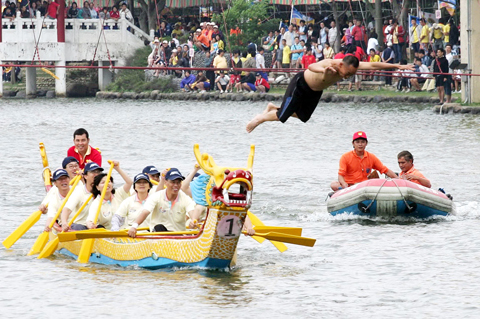While hundreds of thousands of travelers hit the road on the first day of the Dragon Boat Festival holiday yesterday, Taipei Railway Station and Songshan Airport were also packed with holidaymakers.
While traffic congestion was reported at 6pm on the southbound lanes of Freeway No. 5 near the Hsuehshan Tunnel, traffic on other freeways was relatively smooth.
Taiwan Area National Freeway Bureau traffic management division chief Kang Jyh-fu (康志福) said 360,000 vehicles traveled on the nation’s freeways between midnight and 7am yesterday, the bureau’s designated toll-free hours for this year’s Dragon Boat Festival holiday. The number was about 2.4 times the average weekend traffic volume.

PHOTO: SHEN CHI-CHANG, TAIPEI TIMES
The bureau estimated that traffic will be heavy today from 8am to 1pm on the southbound lanes from Taoyuan to Jhongli (中壢) on Freeway No. 1, from Yingge (鶯歌) to Dasi (大溪) on Freeway No. 3 as well as on the southbound lanes on Freeway No. 5.
Motorists are advised to check for updated traffic reports on the bureau’s Web site at www.freeway.gov.tw.
Taipei Railway Station was filled with travelers eager to return to their hometowns yesterday. Many of the trains heading to the south or east were packed.
Taipei Songshan Airport was also busy yesterday. The Civil Aeronautics Administration asked UNI Air (立榮航空) and TransAsia Airways (復興航空) to add extra flights to Kinmen and Makung last night to accommodate a large number of passengers who had been placed on waiting lists.
With an eye on the long weekend, the Environmental Protection Administration (EPA) had conducted its water quality inspections this year of 12 of the nation’s most popular swimming spots.
The survey placed all 12 in the EPA’s “superior” category in terms of water quality.
The results represent a drastic improvement from last year’s beach water quality checks. An inspection of 10 destinations in June last year placed just one beach — Taipei County’s New Jinshan Bathing Beach (新金山) — in the “superior” category, while four had “good” water quality, two were ranked as average and three were rated as not suitable for swimming.
“On May 24 and 25 we inspected 10 popular beaches in Taiwan proper, and found all to have superior water quality suitable for swimming,” said Chu Yu-chi (朱雨其), director-general of the EPA’s department of environmental monitoring and information management.
Water quality at beaches is defined by the amount of E. coli bacteria in the water, Chu said.
“Those with E. coli concentrations of less than 1,000 colony-forming units (CFU) are defined as suitable for swimming,’” he said.
Besides New Jinshan, the beaches inspected this year include Baishawan (白沙灣) and Fulong (福隆) in Taipei County, Tunghsiao (通霄) in Miaoli County, Shanyuan (杉原) in Taitung County, Masago (馬沙溝) in Tainan County, Sizihwan (西子灣) and Cijin (旗津) in Kaohsiung City, Kenting Tiaoshih Recreational Seashore (墾丁跳石) in Pingtung County, Chisingtan (七星潭) in Hualien County, Houhu (後湖) on Kinmen and Shanshui (山水) in Penghu County.
Also See: Diabetics warned about festival treats

AGING: As of last month, people aged 65 or older accounted for 20.06 percent of the total population and the number of couples who got married fell by 18,685 from 2024 Taiwan has surpassed South Korea as the country least willing to have children, with an annual crude birthrate of 4.62 per 1,000 people, Ministry of the Interior data showed yesterday. The nation was previously ranked the second-lowest country in terms of total fertility rate, or the average number of children a woman has in her lifetime. However, South Korea’s fertility rate began to recover from 2023, with total fertility rate rising from 0.72 and estimated to reach 0.82 to 0.85 by last year, and the crude birthrate projected at 6.7 per 1,000 people. Japan’s crude birthrate was projected to fall below six,

Conflict with Taiwan could leave China with “massive economic disruption, catastrophic military losses, significant social unrest, and devastating sanctions,” a US think tank said in a report released on Monday. The German Marshall Fund released a report titled If China Attacks Taiwan: The Consequences for China of “Minor Conflict” and “Major War” Scenarios. The report details the “massive” economic, military, social and international costs to China in the event of a minor conflict or major war with Taiwan, estimating that the Chinese People’s Liberation Army (PLA) could sustain losses of more than half of its active-duty ground forces, including 100,000 troops. Understanding Chinese

US President Donald Trump in an interview with the New York Times published on Thursday said that “it’s up to” Chinese President Xi Jinping (習近平) what China does on Taiwan, but that he would be “very unhappy” with a change in the “status quo.” “He [Xi] considers it to be a part of China, and that’s up to him what he’s going to be doing, but I’ve expressed to him that I would be very unhappy if he did that, and I don’t think he’ll do that. I hope he doesn’t do that,” Trump said. Trump made the comments in the context

SELF-DEFENSE: Tokyo has accelerated its spending goal and its defense minister said the nation needs to discuss whether it should develop nuclear-powered submarines China is ramping up objections to what it sees as Japan’s desire to acquire nuclear weapons, despite Tokyo’s longstanding renunciation of such arms, deepening another fissure in the two neighbors’ increasingly tense ties. In what appears to be a concerted effort, China’s foreign and defense ministries issued statements on Thursday condemning alleged remilitarism efforts by Tokyo. The remarks came as two of the country’s top think tanks jointly issued a 29-page report framing actions by “right-wing forces” in Japan as posing a “serious threat” to world peace. While that report did not define “right-wing forces,” the Chinese Ministry of Foreign Affairs was